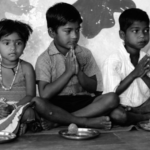Overview
Launched on November 2nd, 2015, the program leverages ANNADA’s unique ‘Central Processing – Local Cooking’ model, wherein the specially formulated Ready to Cook Food mixes are processed centrally and distributed fortnightly to the AWCs. AWW/AWH cooks the meal as per the weekly menu plan and serves the same to the beneficiary.
The model ensures beneficiaries receives fresh and hot cooked meals daily. As of 31st May, cumulatively over 3 lakh meals have been served with ‘ZERO’ Food Safety incident.
Beneficiaries
Every day, the program serves approximately 1445 beneficiaries including kids under the age of 6 years and Pregnant and Lactating Mothers across 24 AWCs. The program implementation has resulted in documented growth promotion of the beneficiaries.
Products
A specific menu range is developed for the program comprising of a range of Meals and Ladoos ensuring overall nutrition of average 500 kcal to all the beneficiaries per day. These products are free from additives and preservatives and are certified by 3rd party NABL accredited lab for its Nutritional Profile, Shelf Life, Chemical Toxins etc. A Higher shelf life of 3 months ensures reduced wastage and expiries.
WEEKLY MENU
A Cyclic Menu That Changes Every Month.
| DAYS | MENU |
|---|---|
| Monday | Dal Khichdi, Ragi Sattu |
| Tuesday | Poha, Chana Sattu |
| Wednesday | Masala Bhaat, Wheat Sattu |
| Thursday | Masala Daliya, Ragi Sattu |
| Friday | Soya Khichdi, Chana Sattu |
| Saturday | Lemon Rice Wheat Sattu |
GRAMMAGE NUTRITION DETAILS
Approximate KCal Value.
| Beneficiaries Age Group | Serving Size (Meal+Laddoo) in gms | Calories (in Kcal) |
|---|---|---|
| 1-2 Years | 100.0 | 215 |
| 2-3 Years | 150.0 | 325 |
| 3-5 Years | 200.0 | 435 |
| Pregnant Women | 300.0 | 650 |
| Lactating Mother | 300.0 | 650 |
| 197.5 | 197.5 | 500 |
All these products are prepared in the ISO 22000:2005 certified production unit at Thane. Continuous product and menu enhancements are conducted by the in-house R&D team on the feedback of the beneficiaries.
Infrastructure Enhancement
Fit-to-purpose infrastructure enhancements were done to enable the AWCs to deliver safe and quality meals. Each AWC is provided with Storage Units, Gas Range, LPG connections, Cooking Utensils, and Cleaning Materials. A Brass Bell is installed in the AWCs to notify the beneficiaries once the meals are ready.
Each AWW/AWH wears hairnet and apron during preparation and serving of the meals. Cleaning material is provided to ensure the hygiene of the cooking and serving area is maintained.
Supply Chain
Hilly terrain and the 40 km geographical spread of the identified Anganwadis makes it a challenging task to ensure seamless timely delivery of products. Supplies are dispatched from Thane every fortnight to the Central Receiving Unit at Jawhar. Material for each Anganwadi is packed in separate bags and labeled for easy identification.
Any non-conforming product is returned back to the CRU. Monthly Inventory audits are conducted for the reconciliation of the supply and consumption ensuring minimum wastage due to expiry or oversupplies.
From the Central Receiving Unit, the material is distributed to the AWCs by the local logistics coordinator within 3 days from receiving the material. AWW/AWH upon receiving the bags verifies the count and the condition of the material and sign-offs the delivery challans/receipts which are then submitted to reconciliation and payments.
People Training
All the Anganwadi Workers and Helpers are extensively trained on Safe Food Handling and Hygiene Best practices and preparation of the meals as per standard operating procedures. Each AWW was given 16 hours of training while AWH received 8 hours of training. Refresher pieces of training are organized every quarter.
Many AWH had never used LPG before; they are trained on safe handling of the same. Training on cooking is also imparted to pregnant and lactating mothers to support the AWW/AWH in the case of emergencies.
Monitoring Supervision









